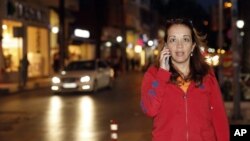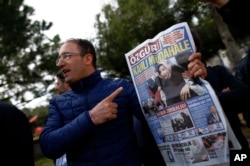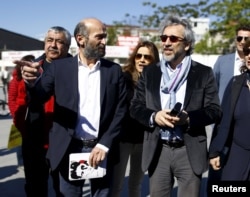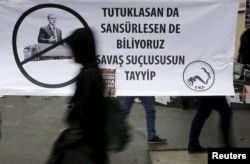Pressure on journalists in Turkey appears to be spreading to the foreign media. This week, four reporters were denied entry into the country.
The most recent was U.S. reporter David Lepeska, who tweeted Monday, “Was just hurried onto a flight to Chicago after being denied entry at Istanbul Ataturk.”
Dutch journalist Ebru Umar was detained by police Sunday at her home in the Turkish Aegean town of Kusadasi. She tweeted, “Police at the door, no joke. ”Umar, who is of Turkish origin, is a well-known feminist reporter. She was detained for a series of tweets quoting her recent article about Turkish President Recep Tayyip Erdogan. Umar was released later Sunday, but told not to leave the country.
Erdogan has enforced a rarely used law criminalizing insults against the president. Since his election in 2014, nearly 2,000 people have been prosecuted, many of them journalists.
“Most of the people to avoid lawsuits, they simply say, 'the Palace,' according to Turkish journalist Sevgi Akarcesme, “I have been sued not only for tweets, but for a comment left under my tweet, which I had no idea about. I received a suspended prison sentence for that.”
Akarcesme was the editor of the English language Today’s Zaman, until it was seized by the courts last month, along with its Turkish sister paper Zaman, one of biggest selling papers in the country, on suspicion of supporting terrorism.
Political difference or conspiracy?
The publications were critical of the government and president, and are linked to Turkish Islamic cleric Fethullah Gulen. He lives in self-imposed exile in the United States and was once a close ally of Erdogan, but they became bitter rivals.
Turkish prosecutors accuses Gulen of heading a terrorist organization.
“All authoritarian governments use the same tactics and tools.In order to silence criticism and media, they refer to terrorism charges,” said Akarcesme. Following the seizure of Zaman and Today's Zaman, Akarcesme said most columnists were dismissed and the editorial line was altered from critical to sympathetic coverage of the president and government.
Erdogan insists he and his ruling AKP are facing a conspiracy to overthrow them, which started back in 2013 with the revelation of corruption allegations implicating family members of the president and senior ministers.They argue Gulen is using the media as part of the conspiracy.
Turkey’s broadly written anti-terror laws are also being used against two of the country’s most prominent journalists, Can Dundar, editor in chief of Cumhuriyet newspaper, and his Ankara bureau chief, Erdem Gul. The men are facing double life sentences and 30 years in jail with aggravated punishment, meaning solitary confinement. They are charged with publishing a story accusing the Turkish state of arms smuggling to Syrian rebels.
“This is politically motivated by the president," argued senior Turkey researcher Emma Sinclair Webb of the U.S.-based Human Right’s Watch.
“He [Erdogan] accused them of an attempted coup, aiding a terrorist organization, spying, and all these were charges that were then written down in the indictment; it's a completely politically motivated trial coming from pressure above. They did not want these journalists reporting on this issue, of trucks and weapons to Syria," Sinclair Webb said.
The journalists were held for nearly three months in pre-trial solitary confinement.Dundar says prison has always been an occupational hazard for Turkish journalists, "So it's a normal step for a journalist in Turkey if you are seeking the truth.“
Dundar and Gul were released after the intervention of the country’s Constitution Court, which ruled their detentions breached their personal and press freedom.Despite the ruling, the case against them continues.
Chilling effect on truth
The severity of the sentences they are facing is being widely seen as a warning.
“This aims to set up an example, to intimidate other journalists,” said Erol Onderoglu, a Turkey representative of Reporters Without Borders
The government argues the country is facing unprecedented threats from the Kurdish rebel group the PKK and Islamic State.
The collapse in the cease-fire with the PKK last year is seen as a factor behind the growing crackdown.
“Certainly the situation has gotten markedly worse recently," said Turkey researcher Andrew Gardner of Amnesty international.
"Now there is unprecedented pressure on the media.Not just criminal prosecutions but also targeting the business interests behind the media companies," he added.
Dogan Media Group, the largest media organization not under direct or tacit control of the government, last year was subject to violent protests led by supporters of the ruling AKP; but, the real problems facing the group are financial investigations.In2009, the group was fined an unprecedented $3.2 billion, following a Hurriyet paper report of a German judge's accusations of corruption by senior Turkish officials.
“Dogan media group is the only remaining big media group independent of the government remaining in the country.Although they are busily self-censoring themselves, they are still on the hit list of the executive,” warns political scientist Cengiz Aktar of Istanbul’s Suleyman Sah University.
Concern about media freedom continues to grow among Turkey’s Western allies.This month, the U.S. State Department, the European Parliament, and Council of Europe voiced concern about growing pressure on media freedom.













